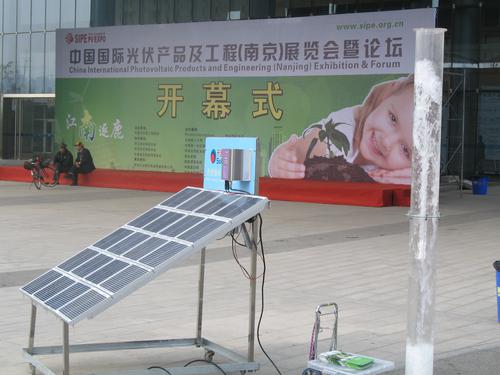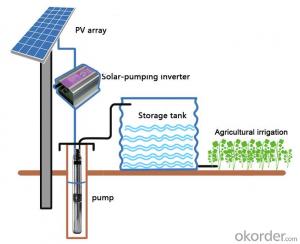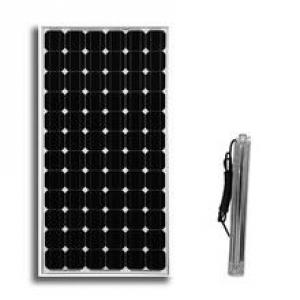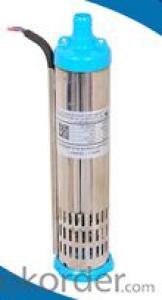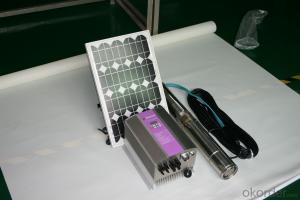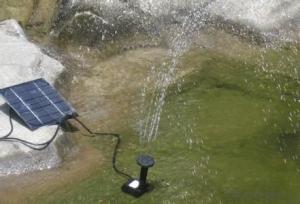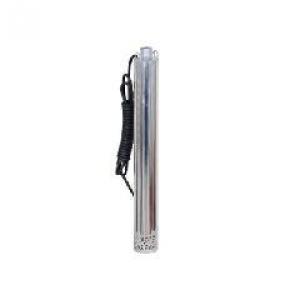Floating Solar Pumping System
- Loading Port:
- Shekou
- Payment Terms:
- TT OR LC
- Min Order Qty:
- 20 set
- Supply Capability:
- 300000 set/month
OKorder Service Pledge
OKorder Financial Service
You Might Also Like
Solar Water Pump is the pumping facility driven by solar energy, which consists of a solar pumping inverter and a pump. Solar water pumps kit is called solar pumping system combining with solar arrays designed according to different head and daily water flow for application. System is widely utilized for agriculture irrigation,desert control,pasture animal husbandry,city landscaping,daily water supply, etc.
In recent years, with the development of photovoltaic products from city application to huge demands of agriculture,pasture,desert areas, Solartech Solar Pond Pump has become the leading products combining photovoltaic industry with traditional industry such as agriculture water conservancy,desert control,daily water supply,city landscaping, etc.
Solar Pump driven by infinite solar energy, works from sunrise, and stops at sunset, need no connection to grid power nor diesel oil and battery. System can irrigate directly or store water instead of electricity in a reservoir. Solar fountain Pumps works with sprinkling irrigation, drip irrigation and infiltrating irrigation facilities, can be more efficient for water saving and dramatically lower the cost of using fossil energy.
Technical Features
Solar Water Pump is a pumping device powered by solar energy, consists of a solar pumping inverter and a deeo well pump, mainly used for agriculture irrigation, desert control, pasture animal husbandry, city waterscape, seawater desalination, living water supply and so on.
Use solar energy, need no connection to grid. Automatically operation, maintenance free.
Easy to install and move, high universality. Clean and green, high economic benefits.
Solartech solar pump kit also named solar water pumps, solar pond pump, solar borehole pump, solar funtain pumps, solar powered water pump, solar irrigation pump, solar deep well pump, and solar submersible pump.
Product Specifications
SPC830K700 | 3PH 380V 50Hz | 52-35m | 540-700m³ | 100mm | 4" | 250-300mm | 625-750VDC | 500-600VDC |
SPC837K270 | 3PH 380V 50Hz | 150-125m | 210-270m³ | 65mm | 2.5" | 250-300mm | 625-750VDC | 500-600VDC |
SPC837K330 | 3PH 380V 50Hz | 125-100m | 270-330m³ | 76mm | 3" | 250-300mm | 625-750VDC | 500-600VDC |
SPC837K420 | 3PH 380V 50Hz | 100-80m | 330-420m³ | 76mm | 3" | 250-300mm | 625-750VDC | 500-600VDC |
SPC837K540 | 3PH 380V 50Hz | 80-60m | 420-540m³ | 100mm | 4" | 250-300mm | 625-750VDC | 500-600VDC |
SPC837K700 | 3PH 380V 50Hz | 60-40m | 540-700m³ | 100mm | 4" | 250-300mm | 625-750VDC | 500-600VDC |
SPC845K270 | 3PH 380V 50Hz | 180-145m | 210-270m³ | 65mm | 2.5" | 250-300mm | 625-750VDC | 500-600VDC |
SPC845K330 | 3PH 380V 50Hz | 145-120m | 270-330m³ | 76mm | 3" | 250-300mm | 625-750VDC | 500-600VDC |
SPC845K420 | 3PH 380V 50Hz | 120-98m | 330-420m³ | 76mm | 3" | 250-300mm | 625-750VDC | 500-600VDC |
SPC845K540 | 3PH 380V 50Hz | 98-72m | 420-540m³ | 100mm | 4" | 250-300mm | 625-750VDC | 500-600VDC |
SPC845K700 | 3PH 380V 50Hz | 72-50m | 540-700m³ | 100mm | 4" | 250-300mm | 625-750VDC | 500-600VDC |
SPC855K270 | 3PH 380V 50Hz | 200-170m | 210-270m³ | 65mm | 2.5" | 250-300mm | 625-750VDC | 500-600VDC |
SPC855K330 | 3PH 380V 50Hz | 170-155m | 270-330m³ | 76mm | 3" | 250-300mm | 625-750VDC | 500-600VDC |
SPC855K420 | 3PH 380V 50Hz | 155-125m | 330-420m³ | 76mm | 3" | 250-300mm | 625-750VDC | 500-600VDC |
SPC855K540 | 3PH 380V 50Hz | 125-95m | 420-540m³ | 100mm | 4" | 250-300mm | 625-750VDC | 500-600VDC |
SPC855K700 | 3PH 380V 50Hz | 95-65m | 540-700m³ | 100mm | 4" | 250-300mm | 625-750VDC | 500-600VDC |
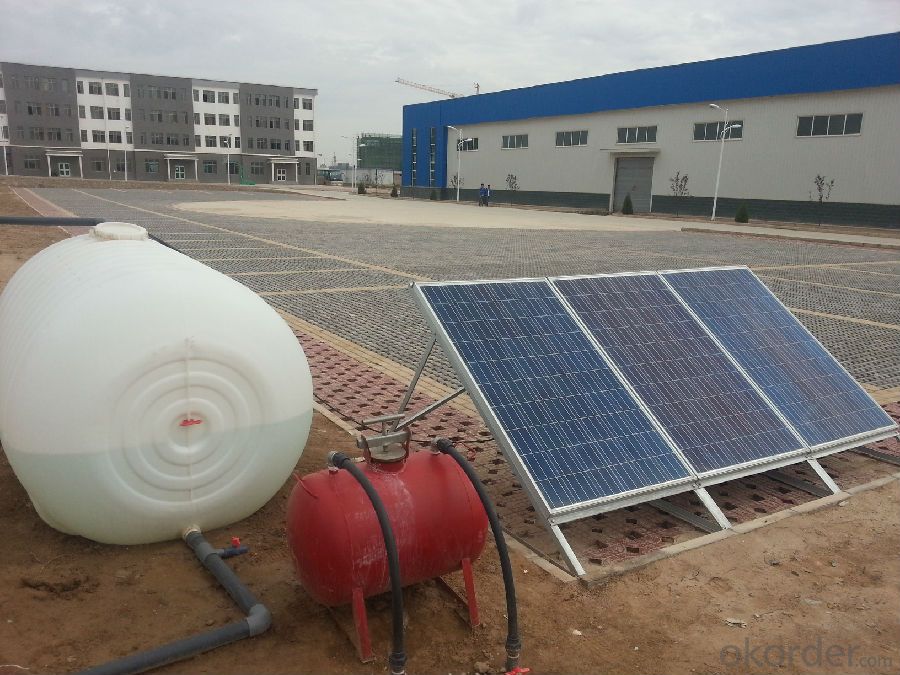
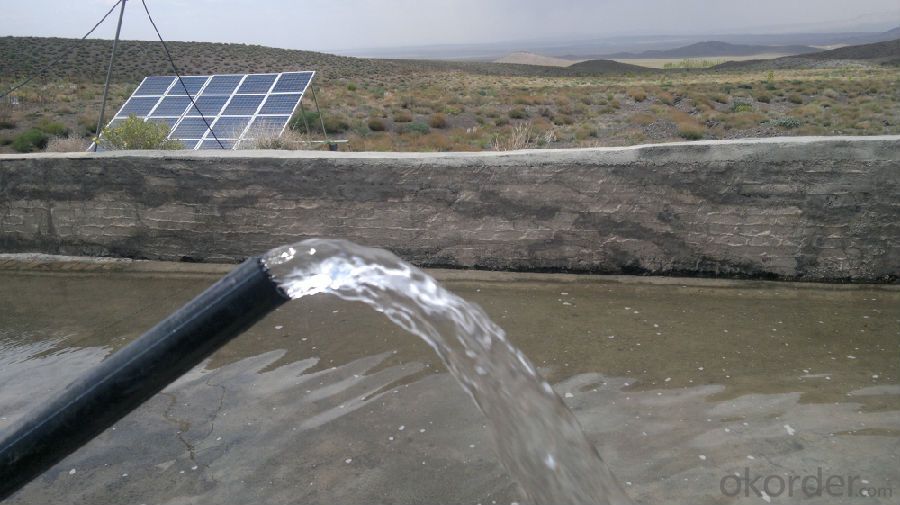
- Q: How does the quality of solar panels affect the performance of a solar pump system?
- The quality of solar panels plays a crucial role in determining the performance of a solar pump system. High-quality solar panels are designed to efficiently convert sunlight into electricity, ensuring a consistent and reliable power supply for the pump system. On the other hand, low-quality or substandard solar panels may have lower efficiency and may not be able to generate sufficient electricity to power the pump system adequately. One of the key factors that affect the performance of solar panels is their efficiency in converting sunlight into electricity. High-quality solar panels typically have a higher efficiency rating, meaning they can generate more electricity from the same amount of sunlight compared to lower-quality panels. This increased efficiency translates into more power available to operate the solar pump system, allowing it to pump water at a higher rate or maintain operation during periods of low solar irradiation. Moreover, the durability and reliability of solar panels are also critical factors in their performance. High-quality panels are designed to withstand various weather conditions and have a longer lifespan, ensuring consistent performance over time. In contrast, low-quality panels may deteriorate quickly, lose efficiency, or even fail prematurely, leading to reduced performance or complete system failure. Another aspect to consider is the quality of the materials used in the construction of the solar panels. High-quality panels are made with premium materials and advanced manufacturing processes, ensuring better resistance to environmental factors such as UV radiation, extreme temperatures, and humidity. This results in improved longevity and performance of the solar panels, ultimately benefiting the overall performance of the solar pump system. In conclusion, investing in high-quality solar panels for a solar pump system is essential to maximize its performance and efficiency. These panels offer higher conversion efficiency, improved durability, and longer lifespan compared to low-quality alternatives. By choosing high-quality solar panels, the system can operate reliably and consistently, providing sufficient power to meet the water pumping requirements even in challenging conditions.
- Q: Can a solar pump be used for water supply in aquaculture farms?
- Yes, a solar pump can be used for water supply in aquaculture farms. Solar pumps are an environmental-friendly and cost-effective solution for aquaculture farms as they utilize the sun's energy to power the pump. They can be used to circulate and aerate water in fish ponds, provide water for fish tanks, or transfer water between different parts of the farm. Solar pumps can help reduce reliance on grid electricity and minimize operational costs while ensuring a consistent and sustainable water supply for aquaculture activities.
- Q: Are solar pumps suitable for use in cold climates?
- Yes, solar pumps can be suitable for use in cold climates. While extreme cold temperatures may affect their performance, solar pumps are designed to withstand freezing temperatures and continue operating efficiently. Additionally, advancements in technology have made solar pumps more resilient to cold weather conditions, allowing them to function reliably even in colder climates.
- Q: What is the expected lifespan of the inverter used in a solar pump system?
- The lifespan of an inverter used in a solar pump system can vary depending on various factors. Typically, a well-maintained and high-quality inverter can last for 10 to 20 years. There are several factors that can influence the lifespan of an inverter. The quality of the inverter itself is crucial. Opting for a reputable brand and a high-quality inverter can significantly increase its longevity. Additionally, the type of inverter, such as string inverters or microinverters, can also impact its expected lifespan. The environmental conditions in which the inverter operates also play a role in its longevity. Extreme temperatures, excessive humidity, or direct sunlight exposure can accelerate wear and tear on the inverter components, potentially reducing its lifespan. Therefore, it is important to install the inverter in a well-ventilated and shaded area to minimize environmental stress. Regular maintenance and proper care can also extend the lifespan of an inverter. It is important to keep the inverter clean, check for any loose connections, and conduct routine inspections to identify and address potential issues early on, preventing further damage. Lastly, the load and usage patterns of the solar pump system can impact the inverter's lifespan. If the system consistently operates at high loads or experiences frequent fluctuations, it may strain the inverter, potentially shortening its lifespan. In conclusion, while the expected lifespan of an inverter used in a solar pump system can vary, selecting a high-quality inverter, maintaining it properly, and ensuring optimal operating conditions can help maximize its longevity.
- Q: How does a solar pump handle water with high levels of hardness?
- A solar pump does not directly handle water hardness levels. However, if the water source has high levels of hardness, it may affect the overall performance and lifespan of the solar pump.
- Q: Can a solar pump be used for water supply in public parks or gardens?
- Yes, a solar pump can definitely be used for water supply in public parks or gardens. Solar pumps are an eco-friendly and cost-effective solution for providing water in outdoor spaces. They harness solar energy to power the pump, eliminating the need for electricity or fuel. Solar pumps can efficiently draw water from wells, rivers, or other sources and distribute it for irrigation, fountains, or any other water feature in public parks or gardens.
- Q: What is the difference between centrifugal pumps and circulating pumps?
- Often, it is not possible to clearly delineate the obvious boundaries of the two pumps you are talking about.
- Q: How does a solar pump handle water with high alkalinity?
- A solar pump can handle water with high alkalinity without any issues. The alkalinity of the water does not affect the functioning or efficiency of the solar pump in any way.
- Q: How does a solar pump help in reducing the risk of electrical accidents?
- A solar pump helps in reducing the risk of electrical accidents by operating solely on solar power, eliminating the need for electrical connections and wiring. This eliminates the risk of electrical shocks or short circuits, making it a safer alternative for both users and the environment.
- Q: What is the average cost of a solar pump?
- The average cost of a solar pump can vary depending on factors such as the size, capacity, and brand. However, a rough estimate for a typical solar pump can range from $1,000 to $5,000.
Send your message to us
Floating Solar Pumping System
- Loading Port:
- Shekou
- Payment Terms:
- TT OR LC
- Min Order Qty:
- 20 set
- Supply Capability:
- 300000 set/month
OKorder Service Pledge
OKorder Financial Service
Similar products
Hot products
Hot Searches
Related keywords






